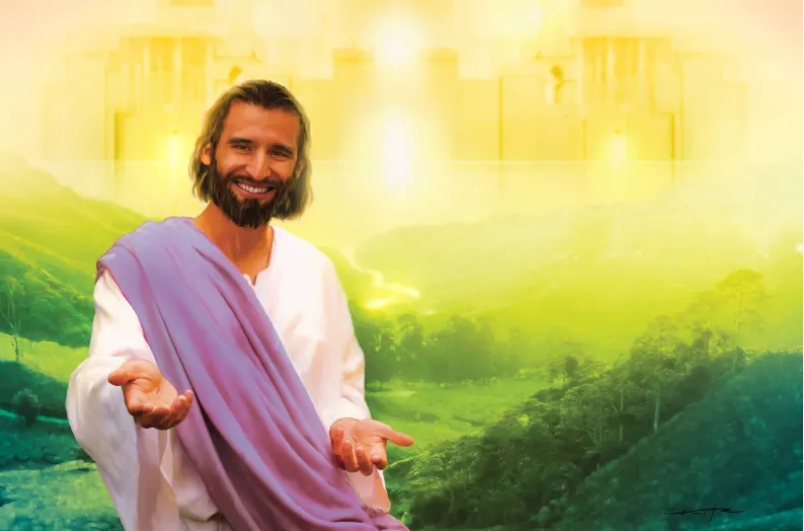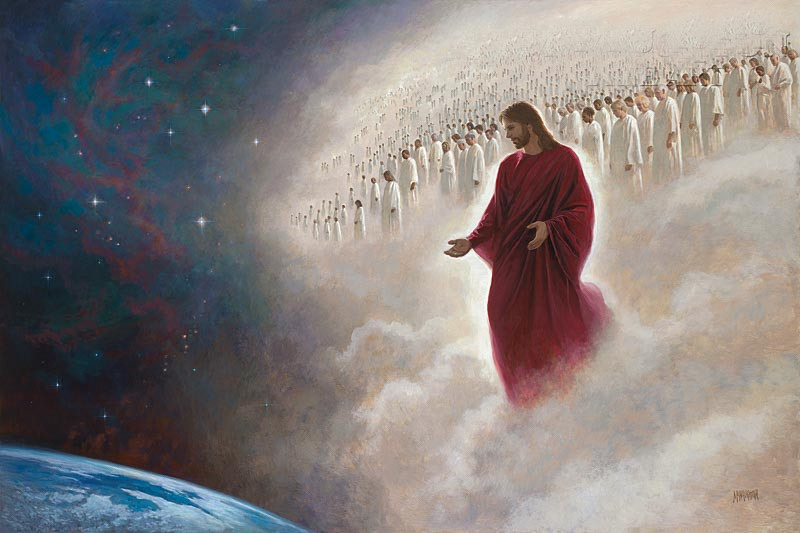To accompany your Come Follow Me study for December 25-31
In addition to reading the indicated chapters, you may wish to:
Read the applicable portions of the New Testament Institute Student Manual at :
- Chapter 55: Revelation 12–16 (churchofjesuschrist.org)
- Chapter 56: Revelation 17–22 (churchofjesuschrist.org)
See the following videos:
If you would like a Kahoot game related to this material which you could use for personal study or use with your family or your class, click here: https://create.kahoot.it/share/revelation-15-22/1d91019d-6210-476f-96c7-7cf75830e814 . (To use it with a group, after clicking on this link, you will need to log into Kahoot, creating a free account if you have not done so previously, then click on the blue “Start” button.)
Points to Ponder in Revelation 15-22
1. What hymn in the Latter-day Saint hymnbook is based on Revelation 15:3-4?
2. What is the “song of Moses” that the redeemed will sing on the sanctified earth, evidently with harp accompaniment? (15:3)
3. What do we know about “the seven heads [which] are seven mountains, on which the woman sitteth”? (17:9)
4. What would you consider the most important counsel John gives in Revelation 15-18?
5. Is Jesus finally getting married in 19:7? Who is the lucky girl?
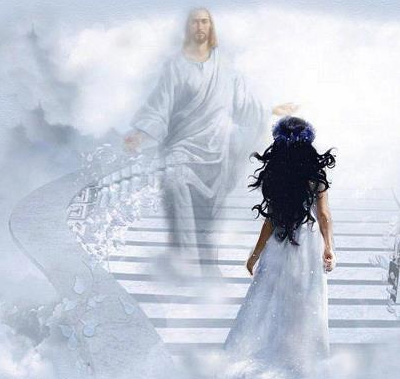
6. 19:9 refers to the “marriage supper of the Lamb.” Where else do we read of such an event?
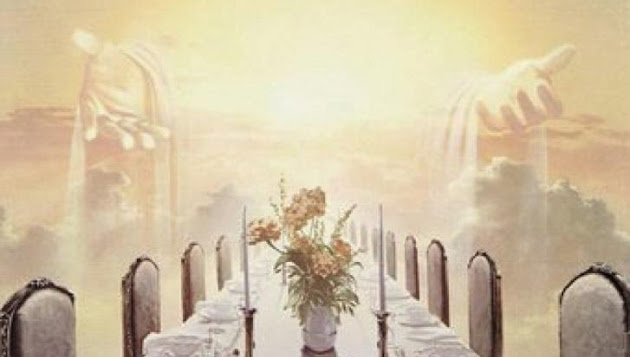
7. Revelation 21:8 tells us that “all liars,” among others, will have their part in the lake which burneth with fire and brimstone: which is the second death.” Does that include a young boy who once told his mother that he did not get into the jam, and that he wasn’t lying, when he really was? Or is there still hope for me? Explain.

8. If the personage who has been speaking to John is just a regular angel, and not Jesus Christ, why does he keep saying things like, “I am Alpha and Omega, the beginning and the ending,… the first and the last”?
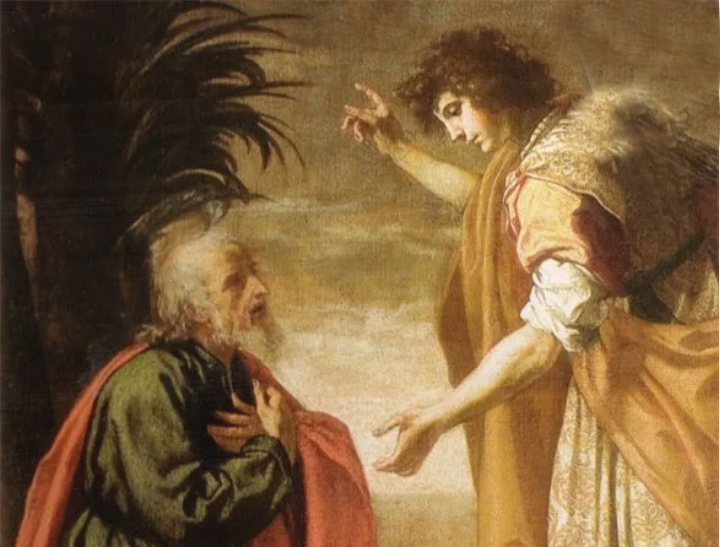
9. What does it mean that “the testimony of Jesus is the spirit of prophecy”?

10. Revelation 19:15, which tells us that out of Jesus’ mouth “goeth a sharp sword” with which He would smite the nations, and that He would “rule them with a rod of iron” sounds pretty harsh. What are we to understand by this?

11. What does it mean that we will be judged “out of those things which were written in the books,” according to our works? (Revelation 20:12.)
12. How is it that Latter-day Saints can believe in a Book of Mormon and other latter-day scripture, when at the very end of the Bible (Revelation 22:18) it forbids adding anything to that book?
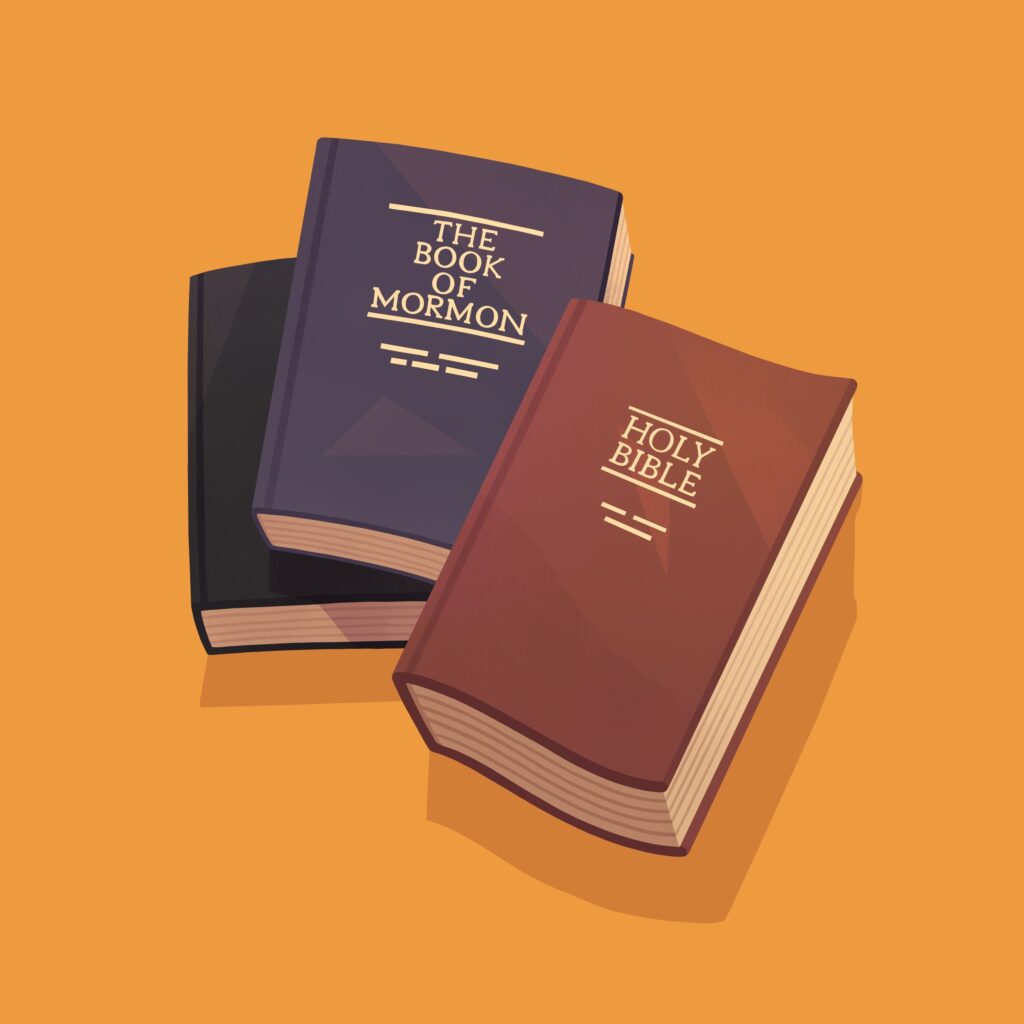
13. Much of the Book of Revelation is full of imagery of warfare and destruction, as the wicked receive the fruits of their evil deeds. But the final three chapters provide a happy ending to the story. What are your five favorite passages in chapters 20-22, and why?
Possible Answers to Points to Ponder in Revelation 15-22
1. What hymn in the Latter-day Saint hymnbook is based on Revelation 15:3-4?
Hymn 267, “How Wondrous and Great,” was written by Henry U. Onderdonk, the Episcopal bishop of Pennsylvania. The hymn has been used in various Christian hymnals, including that of The Church of Jesus Christ of Latter-day Saints.
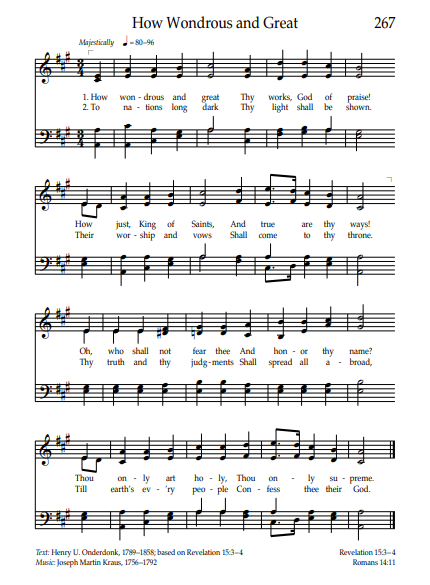
2. What is the “song of Moses” that the redeemed will sing on the sanctified earth, evidently with harp accompaniment? (15:3)
It is the song which Moses and the children of Israel sang to the Lord following the parting of the Red Sea and their deliverance from Pharaoh’s army, as detailed in Exodus 15:1-18.
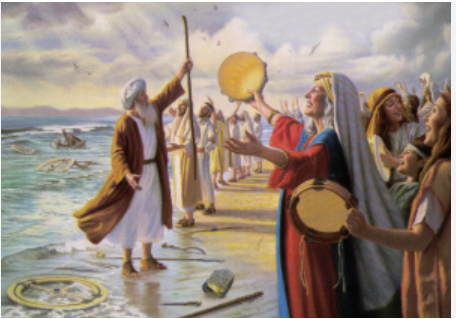
3. What do we know about “the seven heads [which] are seven mountains, on which the woman sitteth”? (17:9)
Ancient Rome was built on seven hills, and many commentators have believed that John was referring to it in this verse. Rome at that time was the headquarters of those who opposed the new Christian Church. Today there is no one city which represents the devil’s domain more than any other, but the spirit of the anti-Christ whom John foresaw can be found among all nations and cities.
4. What would you consider the most important counsel John gives in Revelation 15-18?
Your choice. The passage which stands out to me is 18:4, which says, “Come out of her [Babylon], my people, that ye be not partakers of her sins, and that ye receive not of her plagues.” Just as the “gathering of Israel” in our time is more a gathering to the Church than a physical move, so is the coming out from Babylon likely to be accomplished by a change of behavior more than a change of residence.
5. Is Jesus finally getting married in 19:7? Who is the lucky girl?
While Jesus may well have His own literal wife in eternity, as will all of those exalted in the celestial kingdom, this passage is purely symbolic. It compares the covenants of the righteous to be true and faithful to the Savior to the promises a bride would make at her marriage. Verse 8 indicates that the bride is dressed in “fine linen, clean and white, which “is the righteousness of saints.” So, the “bride” in this symbolic sense is the body of the saints, or righteous Church members.
6. 19:9 refers to the “marriage supper of the Lamb.” Where else do we read of such an event?
This seems to be the fulfillment of the Parable of the Marriage of the King’s Son, related in Matthew 22:2-13. D&C 27:5-14 speaks of a great sacrament service attended by the righteous from all dispensations. This is likely the same event. Isaiah 25:6, D&C 58:8-11, and D&C 65:3 all seem to foretell the same great latter-day feast after the Savior comes.

7. Revelation 21:8 tells us that “all liars,” among others, will have their part in the lake which burneth with fire and brimstone: which is the second death.” Does that include a young boy who once told his mother that he did not get into the jam, and that he wasn’t lying, when he really was? Or is there still hope for me? Explain.
Having changed your car’s oil once doesn’t make you an auto mechanic. Planting tomatoes once doesn’t make you a farmer. Even though you drove a pickup once, you wouldn’t therefore introduce yourself as a “truck driver.” And having told a lie once (or even on multiple occasions) doesn’t mean you are forever to be considered a “liar.” Only those who have made lying a habitual part of their nature and so continue until judgment day need fear the threatened punishment of Revelation 21:8.
8. If the personage who has been speaking to John is just a regular angel, and not Jesus Christ, why does he keep saying things like, “I am Alpha and Omega, the beginning and the ending,… the first and the last”?
The angel was sent to John to represent Jesus Christ, and he speaks in the first person as though he were the Savior Himself. Jesus similarly often speaks in the name of the Father, through what the First Presidency called “divine investiture of authority.” It is worth noting that since the fall of Adam, the Father has personally seldom if ever spoken directly to men on the earth, other than to introduce the Son and bear record of Him, as at the baptism of Jesus and in the First Vision of Joseph Smith. This a key to avoiding confusion when reading the scriptures. This is why D&C 29, for example, can start out saying, “Listen to the voice of Jesus Christ, your Redeemer, the Great I Am,” but then in verse 46 speak of “mine Only Begotten.” He is there speaking as the Father, in the first person, though it is still Jesus who is doing the speaking. Moses 1 is a similar case.98. What does it mean that “the testimony of Jesus is the spirit of prophecy”?
9. What does it mean that “the testimony of Jesus is the spirit of prophecy”?
Contrary to what is often assumed, “prophecy” does not necessarily mean predicting the future but means to speak under inspiration from God. Paul reminded us back in 1 Corinthians 12:3 that “no man can say [or know] that Jesus is the Lord, but by the Holy Ghost.” So, if one is truthfully saying in a fast and testimony meeting that he knows that Jesus is the Christ, he is effectively testifying that he has had a revelation to that effect. No gift could be more important than that. This is why Moses could say, “Would God that all the Lord’s people were prophets, and that the Lord would put his spirit upon them!” (Numbers 11:29.) Paul similarly urged the early saints to desire the gift of prophecy above all other spiritual gifts (1 Corinthians 14:1), assuring them that “ye may all prophesy one by one, that all may learn, and all may be comforted.” (1 Corinthians 14:31.)
10. Revelation 19:15, which tells us that out of Jesus’ mouth “goeth a sharp sword” with which He would smite the nations, and that He would “rule them with a rod of iron” sounds pretty harsh. What are we to understand by this?
Joseph Smith thought it sounded overly harsh, too, and was inspired to change it as follows in the Joseph Smith Translation to more nearly reflect what he understood was to happen: “And out of his mouth proceedeth the word of God, and with it he will smite the nations: and he will rule them with the word of his mouth.”
11. What does it mean that we will be judged “out of those things which were written in the books,” according to our works? (Revelation 20:12.)
There are at least two ways to understand this, both of which are no doubt part of the truth:
- We will be judged by the light we had. If we had access to the Bible, we will be judged accordingly. If we had the Book of Mormon and other latter-day scriptures as well, we will be held accountable for how we lived in relation to the light provided by those books.
- We will be judged according to the written record of our deeds. In 3 Nephi 27:24-26, for example, the Savior told the Nephites, “Write the works of this people,… For behold, out of the books which have been written, and which shall be written, shall this people be judged, for by them shall their works be known unto men.” Fortunately, He continued, “All things are written by the Father; therefore out of the books which shall be written shall the world be judged.” The importance of our keeping the best record we can was further highlighted by Joseph Smith in D&C 128:7-8, where he wrote, referring to Revelation 20:12: “The books spoken of must be the books which contained the record of their works and refer to the records which are kept on the earth…. Or in other words,… whatsoever you record on earth shall be recorded in heaven, and whatsoever you do not record on earth shall not be recorded in heaven.” It is not clear what happens if there is a discrepancy between the records kept by men and those kept by the Father. Presumably, that of the Father would take precedence, However, in the case of essential ordinances, it may be that the Father’s record is primarily to ratify, not replace, records we keep on earth, in which case essential ordinances performed but not recorded on earth would need to be redone.
12. How is it that Latter-day Saints can believe in a Book of Mormon and other latter-day scripture, when at the very end of the Bible (Revelation 22:18) it forbids adding anything to that book?
When John refers to “this book,” he is referring to Revelation, not the Bible, which didn’t yet exist. He is simply saying not to tamper with the text he has just written. As we saw three weeks ago, there is good reason to believe that John himself wrote his own epistles and possibly the Gospel of John after writing Revelation.
Furthermore, the warning is to men, that they not add to nor take away from God’s word. It in no way would prohibit God from giving additional scripture.
Of note is the fact that Deuteronomy 4:2 has a similar warning, that “Ye shall not add unto the word which I command you, neither shall ye diminish ought from it.” If we interpreted that passage the way some want to interpret Revelation 22:18, we would have to discard everything in the Bible after Deuteronomy 4.
13. Much of the Book of Revelation is full of imagery of warfare and destruction, as the wicked receive the fruits of their evil deeds. But the final three chapters provide a happy ending to the story. What are your five favorite passages in chapters 20-22, and why?
Mine are:
- 20:2-3: Satan will be bound for a thousand years and have no power to deceive the nations nor tempt the Lord’s people.
- 20:4, 6: The righteous, including Christian martyrs, live and reign with Christ and serve as priests of God during the thousand years.
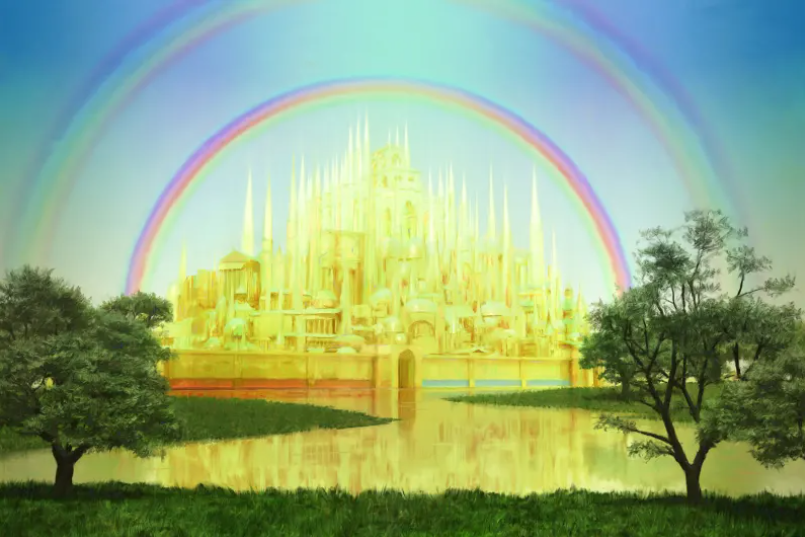
- 20:12-13: Death and hell deliver up their dead and all are judged according to their works.
- 21:1-4, 16; 22:1-5: At the end of the Millennium, the earth will be celestialized. A highlight will be the holy city, the New Jerusalem, with God dwelling with His people in a place without death, sorrow, or pain. According to verse 16, the city will be enormous, measuring some 1380 miles on each side, and being as high as it is long or wide, thus containing more than 2.5 billion cubic miles, with a wall some 216 feet high! John foresaw that the city gates would never be shut, as there would be no night there, nor need for the sun nor moon, for the glory of God Himself would provide the light. The curse would be taken from the earth, and those in the city would gaze individually upon the face of God.
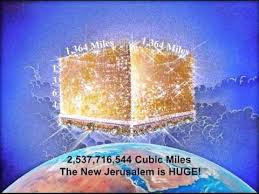
- 21:7: Those who overcome will “inherit all things,” which suggests our having the privilege of continuing in God’s own steps.
